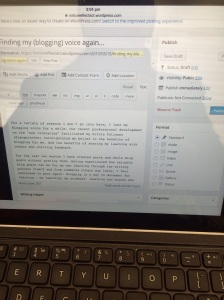
The end of Term 1 is nearing and there is a lot happening for our teachers. All teachers are time poor. Managing the tipping point between flourishing and being overwhelmed is tricky because the tipping point is different for everyone. Sometimes the timing of priorities collide and this can tip the scales. We reached this point late this week and I ended up going against my better judgement in an effort to keep the scales balanced. I realised immediately that although I was keeping the scales balanced, it would only be a short term gain. The cost could end up being too high for some teachers and in my role, I need to ensure this is not the case where possible.
Let me set the scene…
This week our teachers have been immersed in professional learning under the guidance of Silvia Tolisano (@langwitches), a visiting expert. It’s been an inspirational few days and a busy time too as teachers have moved between teaching, meetings, professional development and wanting to implement their learning, blogging, duties, enrichment activities, replying to emails, etc. The tension has in fact been building over the last couple of weeks. By mid week, I realised (as did others) that the tipping point had been reached for some and was drawing nearer for others. I wondered what I could do to support teachers without disempowering them. In briefing on Thursday (and in one on one conversations with a few teachers), I expressed my understanding of the additional time pressure they are all under at the moment. I offered to teach their classes to free up time for them to communicate with their students’ parents and catch up on other professional responsibilities without feeling they were losing teaching and learning time with their students.
This was well received by some. A few felt this was placing additional pressure on them to fit this all in before the end of term.
Later on Thursday, I followed my Deputy Principal’s advice (who, in turn, recognised that some teachers were feeling overwhelmed) and I sent an email explaining that teachers do not need to contact all parents and to use their discretion as to who needs to be called. This did not sit comfortably with me and (as I explained to our Deputy Principal later:-)) I should not have done this as this is not setting teachers up for success in their ongoing relationship with all parents. He agreed with me. Following two separate conversations re this matter with parents on Friday (one was sharing how happy she was with her child’s teacher’s communication and the other was voicing exactly the opposite as she had not heard directly from her child’s General Studies teacher since Parent Orientation night) I decided it was in our best interests to explain why it is to their benefit to contact all parents this term. I did this via email to ensure clear communication to all concerned and time for teachers to process its content.
I reminded them of the following in what I hope is perceived as a supportive tone: Contacting all parents in our home class and number classes once (unless needs require more contact) every term is an expectation and something we do practise in our primary school. Parents expect to find out how their child has transitioned from one year level to another or one number group to another- they want to know if their child is happy and is learning. Parents want to know that their child’s class teacher cares about and understands the needs of their child. This is a reasonable expectation. Making contact via a phone call or email once a term, evidence shows, is positively received and goes a long way to earning parents’ trust and respect. This will also set teachers up for positive interactions with parents at school events and long term.
I do also know from experience that some phone calls can go on for a while and sometimes the teachers and parents end up playing phone tennis before successful contact is even made. This is time consuming. In addition, I recognise that during the previous two weeks all teachers have been time poor due to ongoing professional development, excursions, duties, enrichment, achrayim responsibilities, learning to use your MacBooks, setting up class blogs, planning, etc. The next two weeks is also going to be busy with seders, galas, PD and planning. I am genuinely happy to teach their classes to free them up to make their phone calls without worrying about losing teaching/learning time with their students. I have also offered to cover their duties or enrichment activity where possible. This is something I am willing to do throughout the year.
I apologised for sending mixed messages re. communication with parents.
One teacher contacted me within the hour to make arrangements for me to teach her class on Monday morning.
Prioritising – another way to create time…
In regards to our monthly newsletter requirement, I decided that in an eight week term, and taking into consideration all of the above, there is no time to send out a second newsletter at the end of this term as writing these and inserting photographs takes hours. In the same email I have simply asked teachers to ensure they have sent out one newsletter this term.
I do genuinely appreciate everything our teachers do and have huge respect for what they accomplish every day, week, month and year. I have not forgotten what it’s like.
What ways do you have for managing the tipping point and creating time for your teachers?


